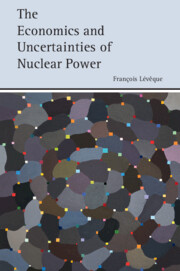Book contents
- Frontmatter
- Contents
- List of Abbreviations
- Introduction
- Part I Estimating the costs of nuclear power
- Part II The risk of a major nuclear accident
- Four Calculating risk
- Five Perceived probabilities and aversion to disaster
- Six The magic of Bayesian analysis
- Part III Safety regulation
- Part IV National policies and international governance
- Notes
- Index
Five - Perceived probabilities and aversion to disaster
Published online by Cambridge University Press: 05 January 2015
- Frontmatter
- Contents
- List of Abbreviations
- Introduction
- Part I Estimating the costs of nuclear power
- Part II The risk of a major nuclear accident
- Four Calculating risk
- Five Perceived probabilities and aversion to disaster
- Six The magic of Bayesian analysis
- Part III Safety regulation
- Part IV National policies and international governance
- Notes
- Index
Summary
The concept of subjective probability can be a misleading introduction to individuals’ perception of probabilities. Perceived probability, much like its subjective counterpart, varies from one person to the next but it does not take the same route in our brain. The former expresses itself rapidly, effortlessly, in some sense as a reflex response; the latter demands time, effort and supervision. Perceived probability is based on experience and routine, whereas subjective probability is rooted in reason and optimization. In response to the question, ‘Which is the most dangerous reactor: the one for which the probability of an accident over the next year is 0.0001; or the one which has a 1 in 10,000 chance of having an accident over the next year?’, most people will spontaneously pick the second answer. Yet reason tells us that the two reactors are equally dangerous (i.e. 1:10,000 = 0.0001). So how do we perceive risks? Are individuals poor statisticians, or perhaps not statistically minded at all? In which case, what use is the theory of decision under uncertainty, given that it requires us to calculate probabilities accurately? How do individuals make a choice if they do not optimize their decisions? These questions are central to forty years’ work by experimental cognitive psychologists on how individuals assess the probability of events. Understanding this work is essential, for almost all its findings contribute to amplifying the perception of nuclear risk.
Biases in our perception of probabilities
What is the connection between cognitive psychology – which is an experimental science – and economics? In fact, there is a significant link. In 2002, in Stockholm, Daniel Kahneman was awarded the most coveted distinction to which an economist can aspire: the Sveriges Riksbank prize in Economic Sciences in memory of Alfred Nobel. His work was distinguished for ‘having established laboratory experiments as a tool in empirical economic analysis, especially in the study of alternative market mechanisms’. That year, the winner of the Nobel prize for economics was not an economist, but a psychologist!
- Type
- Chapter
- Information
- The Economics and Uncertainties of Nuclear Power , pp. 102 - 117Publisher: Cambridge University PressPrint publication year: 2014



